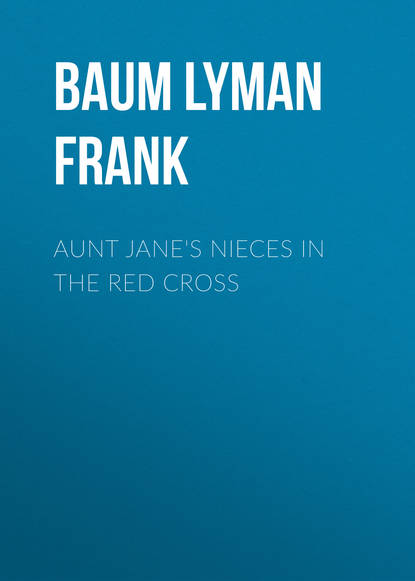По всем вопросам обращайтесь на: info@litportal.ru
(©) 2003-2025.
✖
Aunt Jane's Nieces in the Red Cross
Настройки чтения
Размер шрифта
Высота строк
Поля
"When did you get to town?" asked Beth, greeting the boy cordially. "And why didn't you let us know you were on the way from far-off Los Angeles?"
"Well," said Jones, seating himself facing them and softly rubbing his lean hands together to indicate his satisfaction at this warm reception, "it's a long, long story and I may as well tell it methodically or you'll never appreciate the adventurous spirit that led me again to New York – the one place I heartily detest."
"Oh, Ajo!" protested Patsy. "Is this the way to retain the friendship of New Yorkers?"
"Isn't honesty appreciated here?" he wanted to know.
"Go ahead with your story," said Uncle John. "We left you some months ago at the harbor of Los Angeles, wondering what you were going to do with that big ship of yours that lay anchored in the Pacific. If I remember aright, you were considering whether you dared board it to return to that mysterious island home of yours at – at – "
"Sangoa," said Patsy.
"Thank you for giving me a starting-point," returned the boy, with a smile. "You may remember that when I landed in your country from Sangoa I was a miserable invalid. The voyage had ruined my stomach and wrecked my constitution. I crossed the continent to New York and consulted the best specialists – and they nearly put an end to me. I returned to the Pacific coast to die as near home as possible, and – and there I met you."
"And Patsy saved your life," added Beth.
"She did. First, however, Maud Stanton saved me from drowning. Then Patsy Doyle doctored me and made me well and strong. And now – "
"And now you look like a modern Hercules," asserted Patsy, gazing with some pride at the bronzed cheeks and clear eyes of the former invalid and ignoring his slight proportions. "Whatever have you been doing with yourself since then?"
"Taking a sea voyage," he affirmed.
"Really?"
"An absolute fact. For months I dared not board the Arabella, my sea yacht, for fear of a return of my old malady; but after you deserted me and came to this – this artificial, dreary, bewildering – "
"Never mind insulting my birthplace, sir!"
"Oh! were you born here, Patsy? Then I'll give the town credit. So, after you deserted me at Los Angeles – "
"You still had Mrs. Montrose and her nieces, Maud and Flo Stanton."
"I know, and I love them all. But they became so tremendously busy that I scarcely saw them, and finally I began to feel lonely. Those Stanton girls are chock full of business energy and they hadn't the time to devote to me that you people did. So I stood on the shore and looked at the Arabella until I mustered up courage to go aboard. Surviving that, I made Captain Carg steam slowly along the coast for a few miles. Nothing dreadful happened. So I made a day's voyage, and still ate my three squares a day. That was encouraging."
"I knew all the time it wasn't the voyage that wrecked your stomach," said Patsy confidently.
"What was it, then?"
"Ptomaine poisoning, or something like that."
"Well, anyhow, I found I could stand ocean travel again, so I determined on a voyage. The Panama Canal was just opened and I passed through it, came up the Atlantic coast, and – the Arabella is at this moment safely anchored in the North River!"
"And how do you feel?" inquired Uncle John.
"Glorious – magnificent! The trip has sealed my recovery for good."
"But why didn't you go home, to your Island of Sangoa?" asked Beth.
He looked at her reproachfully.
"You were not there, Beth; nor was Patsy, or Uncle John. On the other hand, there is no one in Sangoa who cares a rap whether I come home or not. I'm the last of the Joneses of Sangoa, and while it is still my island and the entire population is in my employ, the life there flows on just as smoothly without me as if I were present."
"But don't they need the ship – the Arabella?" questioned Beth.
"Not now. I sent a cargo of supplies by Captain Carg when he made his last voyage to the island, and there will not be enough pearls found in the fisheries for four or five months to come to warrant my shipping them to market. Even then, they would keep. So I'm a free lance at present and I had an idea that if I once managed to get the boat around here you folks might find a use for it."
"In what way?" inquired Patsy, with interest.
"We might all make a trip to Barbadoes, Bermuda and Cuba. Brazil is said to be an interesting country. I'd prefer Europe, were it not for the war."
"Oh, Ajo, isn't this war terrible?"
"No other word expresses it. Yet it all seems like a fairy tale to me, for I've never been in any other country than the United States since I made my first voyage here from Sangoa – the island where my eyes first opened to the world."
"It isn't a fairy tale," said Beth with a shudder. "It's more like a horrible nightmare."
"I can't bear to read about it any more," he returned, musingly. "In fact, I've only been able to catch rumors of the progress of the war in the various ports at which I've touched, and I came right here from my ship. But I've no sympathy with either side. The whole thing annoys me, somehow – the utter uselessness and folly of it all."
"Maubeuge has fallen," said Beth, and went on to give him the latest tidings. Finding that the war was the absorbing topic in this little household, the boy developed new interest in it and the morning passed quickly away.
Jones stayed to lunch and then Mr. Merrick's automobile took them all to the river to visit the beautiful yacht Arabella, which was already, they found, attracting a good deal of attention in the harbor, where beautiful yachts are no rarity.
The Arabella was intended by her builders for deep sea transit and as Patsy admiringly declared, "looked like a baby liner." While she was yacht-built in all her lines and fittings, she was far from being merely a pleasure craft, but had been designed by the elder Jones, the boy's father, to afford communication between the Island of Sangoa, in the lower South Seas, and the continent of America.
Sangoa is noted for its remarkable pearl fisheries, which were now owned and controlled entirely by this youth; but his father, an experienced man of affairs, had so thoroughly established the business of production and sale that little remained for his only son and heir to do, more than to invest the profits that steadily accrued and to care for the great fortune left him. Whether he was doing this wisely or not no one – not even his closest friends – could tell. But he was frank and friendly about everything else.
They went aboard the Arabella and were received by that grim and grizzled old salt, Captain Carg, with the same wooden indifference he always exhibited. But Patsy detected a slight twinkle in the shrewd gray eyes that made her feel they were welcome. Carg, a seaman of vast experience, was wholly devoted to his young master. Indeed, the girls suspected that young Jones was a veritable autocrat in his island, as well as aboard his ship. Everyone of the Sangoans seemed to accept his dictation, however imperative it might be, as a matter of course, and the gray old captain – who had seen much of the world – was not the least subservient to his young master.
On the other hand, Jones was a gentle and considerate autocrat, unconsciously imitating his lately deceased father in his kindly interest in the welfare of all his dependents. These had formerly been free-born Americans, for when the Island of Sangoa was purchased it had no inhabitants.
This fortunate – or perhaps unfortunate – youth had never been blessed with a given name, more than the simple initial "A." The failure of his mother and father to agree upon a baptismal name for their only child had resulted in a deadlock; and, as the family claimed a direct descent from the famous John Paul Jones, the proud father declared that to be "a Jones" was sufficient honor for any boy; hence he should be known merely as "A. Jones." The mother called her child by the usual endearing pet names until her death, after which the islanders dubbed the master's son – then toddling around in his first trousers – "Ajo," and the name had stuck to him ever since for want of a better one.
With the Bohemian indifference to household routine so characteristic of New Yorkers, the party decided to dine at a down-town restaurant before returning to Willing Square, and it was during this entertainment that young Jones first learned of the expected arrival of Maud Stanton on the following morning. But he was no wiser than the others as to what mission could have brought the girl to New York so suddenly that a telegram was required to announce her coming.
"You see, I left Los Angeles weeks ago," the boy explained, "and at that time Mrs. Montrose and her nieces were busy as bees and much too occupied to pay attention to a drone like me. There was no hint then of their coming East, but of course many things may have happened in the meantime."
The young fellow was so congenial a companion and the girls were so well aware of his loneliness, through lack of acquaintances, that they carried him home with them to spend the evening. When he finally left them, at a late hour, it was with the promise to be at the station next morning to meet Maud Stanton on her arrival.
CHAPTER II
THE ARRIVAL OF THE GIRL
A sweet-faced girl, very attractive but with a sad and anxious expression, descended from the Pullman and brightened as she found her friends standing with outstretched arms to greet her.
"Oh, Maud!" cried Patsy, usurping the first hug, "how glad I am to see you again!"
Beth looked in Maud Stanton's face and forbore to speak as she embraced her friend. Then Jones shook both hands of the new arrival and Uncle John kissed her with the same tenderness he showed his own nieces.
This reception seemed to cheer Maud Stanton immensely. She even smiled during the drive to Willing Square – a winning, gracious smile that would have caused her to be instantly recognized in almost any community of our vast country; for this beautiful young girl was a famous motion picture actress, possessing qualities that had endeared her to every patron of the better class photo-dramas.

















